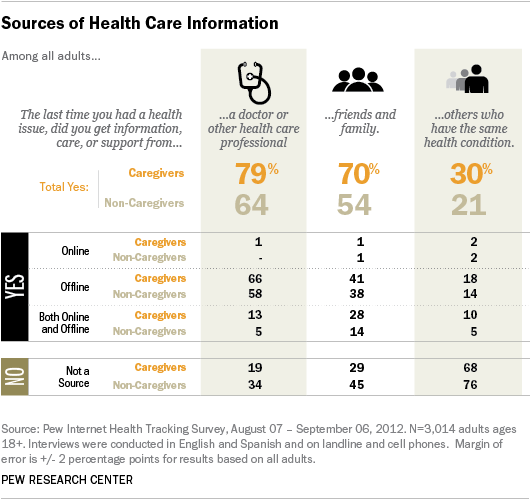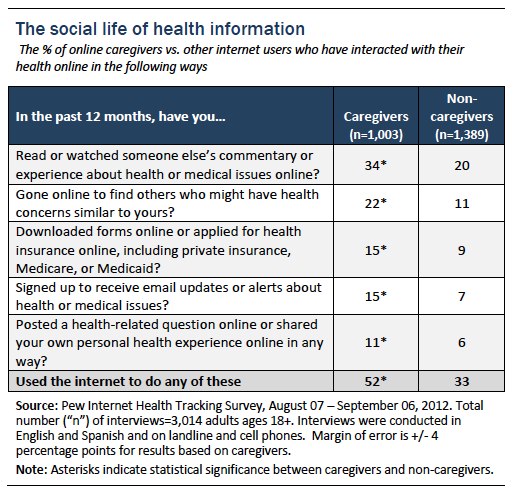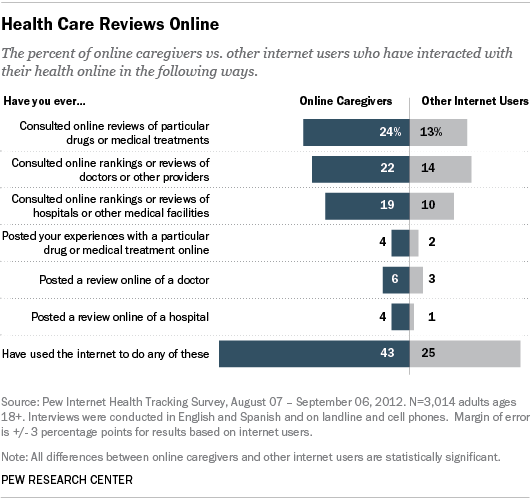Clinicians are a central resource for information or support during serious health episodes—and the care and conversation take place mostly offline
Many caregivers seem to leave no stone unturned when it comes to gathering health information, online or offline, in moments of calm or crisis. In order to capture a typical episode, we asked respondents to think about the last time they had a serious health issue and to whom they turned for help:
- 79% of all caregivers got information, care, or support from a doctor or other health care professional.
- 70% of caregivers got information or support from friends and family.
- 30% of caregivers got information or support from others who have the same health condition.
By comparison, non-caregivers are significantly less likely than caregivers to turn to each of these sources:
- 64% of all non-caregivers got information, care, or support from a doctor or other health care professional.
- 54% of non-caregivers got information or support from friends and family.
- 21% of non-caregivers got information or support from others who have the same health condition.
It is worth noting that caregivers are more likely than non-caregivers to tap all three sources both online and offline. For example, 28% of caregivers say they got online and offline advice and support from family and friends, compared with 14% of non-caregivers. Thirteen percent of caregivers were in contact with a clinician both online and offline, compared with 5% of non-caregivers. And 10% of caregivers obtained online and offline information and support from people who shared the same health condition, compared with 5% of non-caregivers.
When controlling for age, income, education, ethnicity, and good overall health, being a caregiver increases the probability someone will get information from a health care professional, from friends and family, and from people who share the same health condition. In other words, there is a “caregiver effect” that extends to offline health information-gathering, too.

Some seek counsel from fellow patients and caregivers
As noted above, 30% of caregivers sought information, care, or support from other people who share the same concerns during their last serious health episode. We have written about this phenomenon in detail in previous reports, such as “Peer-to-peer Health Care,”8 and it is worth noting that caregivers are significantly more likely than non-caregivers to pursue this type of advice and support online.
Indeed, caregivers are more likely than non-caregivers to engage in a range of online activities related to health:

When controlling for age, income, education, ethnicity, and good overall health, being a caregiver increases the probability that someone will read others’ commentary or experience about health or medical issues online. Being college-educated also increases someone’s likelihood of taking in user-generated health content, such as on a blog or in a video.
Of the 11% of caregivers who posted a health-related question or comment online:
- 45% say they posted comments or stories about personal health experiences
- 16% say they posted specific health questions
- 38% say they posted both
Fully 84% of caregivers who posted a comment, story, or question about their health say that they did so to reach a general audience of friends or other internet users. Eleven percent say they posted somewhere specifically to get feedback from a health professional. Two percent replied that they posted for both a general and a professional audience.
In addition, there is a “caregiver effect” when it comes to using the internet to find other people who share the same health concerns. When controlling for age, income, education, ethnicity, and good overall health, being a caregiver increases the probability that someone will report going online to find peers. Education and ethnicity also play independent roles: being college educated or white also increase the likelihood that someone has gone online for this purpose. By contrast, being age 40 or older decreases the probability of going online to find others with the same health concerns.
One in four online caregivers have consulted reviews of drugs or treatments
One area of online peer advice that continually confounds industry observers is the relative unpopularity of rankings and reviews of doctors, hospitals, and drugs. While 8 in 10 internet users say they have researched a general product or service online, only 2 in 10 internet users have looked up health care reviews.
Caregivers are potentially a ripe market for this type of service. They are more likely than non-caregivers to both read and write health care reviews, as shown in the table below.
Since caregivers’ interest in drug information is particularly high, we tested the significance of the findings related to drug reviews. When controlling for age, income, education, ethnicity, and good overall health, being a caregiver increases the probability that someone will consult online reviews of drugs or medical treatments. Being college educated or wealthier also increases the probability of this consumer-oriented behavior, while being age 40 and older decreases it.





